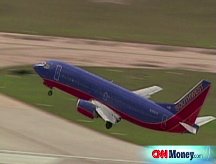Airports cash in on flight delays
Airports are turning into multibillion-dollar shopping malls and service providers for stranded passengers.
NEW YORK (CNNMoney.com) -- Your delayed flight is bad news for you and your airline, but it's money in the bank for the airports.
Delays have become so long that passengers can now even rent DVDs to watch while they wait for their flights. Airports are capitalizing on the growing number of stranded passengers, offering a wide range of new services, but the price leaves some travelers fuming.
"They make you pay $4 for a pint of water, and that's not enough to stave off dehydration," said Diana Fairechild, founder and columnist of the passenger advocate Web site Flyana.com.
"Over the last year, passengers have experienced a much higher level of delay at airports," said Debby McElroy, executive vice president of Policy and External Affairs for Airports Council International-North America, adding that airports now offer dry cleaning, manicures, hair styling, even pet hotels.
"The airports have expanded the services that are available to passengers," said McElroy. "Airports know that people are going to be spending a lot of time there."
During the 1980s and '90s, when record numbers of travelers took to the air, the airports began reinventing themselves as money-making shopping mall-style retail centers, said Pauline Armbrust, chief executive of the industry magazine Airport Revenue News.
Now, she said, the airports are well-poised to take advantage of the increasing delays that have forced passengers to languish longer in the airports. "It benefits them on the sale side, but it doesn't help them on the customer experience side," said Armbrust.
Airport bars, restaurants and shops are conducting a brisk, multibillion-dollar business, as passengers await their flights. Sales have increased to $6.5 billion nationwide in fiscal year 2007, from $6.1 billion in 2005, according to the Federal Aviation Administration.
The most recent figures available from the U.S. Bureau of Transportation Statistics show a dramatic increase in the number of delayed flights.
The worst offenders among the major hubs include Chicago Midway Airport, John F. Kennedy International and LaGuardia airports in New York City, Newark Liberty International in New Jersey, and Miami International Airport.
It's not just the airline delays that are causing problems. The whole culture of flying has changed. Since the terrorist attacks of Sept. 11, 2001, passengers have been forced to spend more time in airports because the Transportation Security Administration expects them to arrive early, said airline industry consultant Robert W. Mann Jr.
"The passenger dwell time in the airport is much, much longer," said Mann, comparing the current situation to pre-2001. "We're not talking marginally; we're talking hours longer."
This adds up to more "forced" time to spend in the bars and shops, said Mann.
The airport industries are also charging for services, like carry-on flight meals, which the money-losing airlines once included as part of coach ticket prices. Most of the major U.S. airlines - including AMR Corp.'s (AMR, Fortune 500) American Airlines, Delta Air Lines Inc. (DAL, Fortune 500), UAL Corp.'s (UAUA, Fortune 500) United Airlines, US Airways Inc. (LCC, Fortune 500) and Northwest Airlines Inc. (NWA, Fortune 500) - charge for in-flight meals and allow passengers to bring their own food.
While some passengers balk at airport prices, Laura Samuels, director of corporate communications for transportation retailer Hudson Group, said that prices are not inflated at the airports. In an e-mail to CNNMoney.com, Samuels said they reflect the local "street prices" where the airport is located, "in some cases allowing a small percentage above to allow for additional handing/freight costs to airports."
"We feel that though customers may be somewhat 'captive' during their wait times at airports, they are also very savvy consumers who know the cost of goods," said Samuels. ![]()



